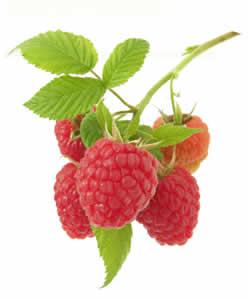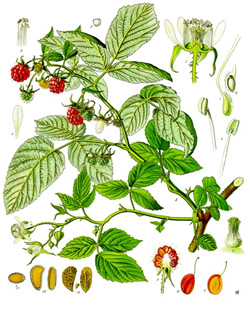Raspberry Rubus idaeus

- Common Names
- Raspberry Leaf , Raspberry Leaf
- Botanical Name
- Rubus idaeus
- Family
- ROSACEAE
Medicinal Uses & Benefits of Raspberry Leaf
![]() How to Use|
Side Effects |
Plant & Garden|
How to Use|
Side Effects |
Plant & Garden|
- Medicinal Uses: * Bed Wetting/incontinence
* Diarrhea
* Herbal Teas
* Longevity Tonics
* Menorrhagia
* Pregnancy/Childbirth
* Sore Throat
- Properties: * Astringent * Diuretic * Febrifuge * Parturient * Stomachic * Tonic * Uterine Tonic
- Parts Used: fruit, leaves, bark
- Constituents: leaves: fragarine, tannin. fruit: sugars, citric and malic acid, vitamins a, b, c and e, pectin, volatile oil, iron, calcium, phosphorus
How to Use: Raspberry
The wild tangle of thorny trailing vines yield a tasty fruit, but it is the leaves that are of interest to the herbalist. Raspberry leaf is a mild and safe medicinal food, and the toothy leaves are commonly used to treat diarrhea, colds, and stomach complaints. An effective and safe remedy for children, raspberry tea is given to reduce fever and calm diarrhea. Raspberry is good tonic herb with a rich supply of vitamins and minerals that help build strong bones and general good health. It can be taken longterm and is generally considered safe with no unwanted side effects.2
The traditional use of raspberry medicinal herb tea is as a female tonic to alleviate menstrual cramps and discomfort. Astringent properties stop excessive bleeding and calm cramps during heavy periods. Raspberry leaf tea is a safe, nutritive, uterine tonic. It is generally recommended for use during the entire nine months of pregnancy and can be taken in the last stages of pregnancy to facilitate childbirth. Raspberry-leaf tea appears to tone the uterine and pelvic muscles. 3
Preparation Methods & Dosage :Raspberry is most often taken in teas and liquid extracts.
Raspberry Remedies
Traditional Chinese Medicine
 The fruit is rich in nutrients and helps to combat anaemia. In Chinese medicine, Chinese raspberries (the fruit) are used to strengthen the kidneys and to treat enuresis. 1
The fruit is rich in nutrients and helps to combat anaemia. In Chinese medicine, Chinese raspberries (the fruit) are used to strengthen the kidneys and to treat enuresis. 1
Raspberry Side Effects: The traditional use of raspberry is to facilitate childbirth. Never use raspberry leaves that are not completely dry, they temporarily develop toxins that can cause nausea.
Plant Description

Koehler's Medicinal-Plants 1887
- Flowers: Royal purple or bluish pink, showy, fragrant, 1 to 2 in. broad, loosely clustered at top of stem. Calyx sticky-hairy, deeply 5-parted, with long, pointed tips; corolla of 5 rounded petals; stamens and pistils very numerous.
- Stem: 8 to 5 ft. high, erect, branched, shrubby, bristly, not prickly.
- Leaves: Alternate, peti-oled, 3 to 5 lobed, middle lobe largest, and all pointed; saw-edged lower leaves immense.
- Fruit: A depressed red berry, scarcely edible.
- Preferred Habitat: Rocky woods, dells, shady roadsides.
- Flowering Season: June - August.
- Distribution: Northern Canada south to Georgia, westward to Michigan and Tennessee.
Purple flowering Virginia Raspberry, Rubus odoratus. To be an unappreciated, unloved relative of the exquisite wild rose, with which this flower is so often likened, must be a similar misfortune to being the untalented son of a great man, or the unhappy author of a successful first book never equalled in later attempts. But where the bright blossoms of the Virginia raspberry burst forth above the roadside tangle and shady woodland dells, even those who despise magenta see beauty in them where abundant green tones all discordant notes into harmony. Purple, as we of to-day understand the color, the flower is not; but rather the purple of ancient Orientals. On cool, cloudy days the petals are a deep rose that fades into bluish pink when the sun is hot.
Netje Blanchan Wild Flowers worth Knowing(1917)Regional Traditions :North America *
Related Species
North American wild raspberry, Rubus strigostts one of the most common indigenous species found throughout North America along roadsides and pastures. All species of raspberry are medicinally useful, red or black.
The blackberries (singular, blackberry; genus Rubus, subgenus Eubatus; also called bramble or occasionally "bramble raspberry")
The wild tangle of thorny trailing vines yield a tasty fruit, but it is the leaves that are of interest to the herbalist. Raspberry leaf is a mild and safe medicinal food, and the toothy leaves are commonly used to treat diarrhea, colds, and stomach complaints. An effective and safe remedy for children, raspberry tea is given to reduce fever and calm diarrhea. Raspberry is good tonic herb with a rich supply of vitamins and minerals that help build strong bones and general good health. It can be taken longterm and is generally considered safe with no unwanted side effects.2
The traditional use of raspberry medicinal herb tea is as a female tonic to alleviate menstrual cramps and discomfort. Astringent properties stop excessive bleeding and calm cramps during heavy periods. Raspberry leaf tea is a safe, nutritive, uterine tonic. It is generally recommended for use during the entire nine months of pregnancy and can be taken in the last stages of pregnancy to facilitate childbirth. Raspberry-leaf tea appears to tone the uterine and pelvic muscles. 3











